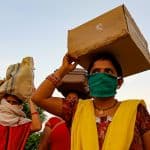Innovation in Action: Lessons From Healthcare Innovators That Rapidly Pivoted To Respond to COVID-19
The COVID-19 pandemic has changed the way we work, pushing all of us to think in new ways and adapt to new circumstances. Health-focused social enterprises are no exception, as they’ve quickly responded to new realities by shifting their modes of patient engagement and even developing entirely new programs.
Innovations in Healthcare, a nonprofit organization housed at Duke University, studied a group of health innovation leaders working in low- and middle-income countries to further understand their COVID-19 responses. The organizations we studied received grants from The Pfizer Foundation’s Global Health Innovation Grants (GHIG) program, which supports projects that seek to improve the prevention, diagnosis and treatment of infectious diseases for underserved populations in low- and middle-income countries. (Innovations in Healthcare is the independent monitoring and evaluation partner to The Pfizer Foundation for the GHIG program.)
Drawing from their entrepreneurial roots, these health-focused innovators have embraced agile thinking, enabling them to continue providing care and maintaining trust during a period of rampant uncertainty. We collected in-depth accounts of these organizations’ on-the-ground experiences developing and implementing new ideas in response to COVID-19, highlighting the ways that they pivoted their work to best adapt to new circumstances. Below, we’ll explore how some of these innovators made rapid adjustments to their services and care delivery models to navigate the challenges of the pandemic.
How Four Organizations Adapted to COVID-19
The 2020 MicroClinic Initiative (2020 MCI) focuses on delivering healthcare and health education to underserved low-wage workers in Kenya. One of its key programs is a series of workplace wellness events held in partnership with employers, during which groups of employees are able to conveniently access screenings, referrals and health education at their workplaces. However, the onset of the COVID-19 pandemic quickly rendered these workplace events impractical.
With a key component of its patient outreach disrupted, 2020 MCI was forced to develop new, creative ways to adjust its usual operations to generate impact and provide health services to vulnerable groups. A fortuitous connection with a leader in the local motorbike delivery community sparked a new idea: 2020 MCI partnered with these motorbike riders to implement a door-to-door medication delivery and telemedicine service that would reach people directly in their homes. With this new program, the organization adapted to the new realities of service delivery and patient access to care presented by the pandemic, and it was able to reach its target patient population.
Fundación Vive con Bienestar (Bive) was working to reduce the burden of cervical cancer in rural Colombia by offering early screening, diagnosis and treatment for HPV, along with education and vaccination campaigns. With the emergence of the pandemic, Bive shifted its work to focus on community education and outreach about COVID-19, providing farming communities with information, infection prevention kits, screening and risk assessments, and connections to local hospitals for further treatment.
THINKMD develops health technology platforms that offer clinical assessment tools to help health workers make appropriate, evidence-based decisions that can improve the quality of health in low- and middle-income countries. In response to COVID-19, the THINKMD team leveraged its technical skills and expertise to develop a digital COVID-19 screening tool, and worked with implementation partners on the ground to distribute the tool to vulnerable communities.
The Society for Nutrition, Education and Health Action (SNEHA) had been carrying out door-to-door outreach in India to provide health education; screenings focusing on maternal, child and newborn health; and referrals to local medical facilities for treatment. As part of its original project, SNEHA also supported health systems strengthening through health worker training. To adapt to COVID-19, the organization shifted away from in-person communications for many of these activities, using telephone hotlines, television broadcasts and loudspeaker announcements for community education, along with online training for health systems strengthening. It leveraged its close relationships within its target communities to adjust its activities to best meet specific community needs.
Learning from Innovative Responses to the Pandemic
We explored these four innovators’ experiences in greater depth by developing a set of case studies detailing the processes, challenges and learnings that drove their responses to COVID-19. Based on what we learned about the experiences of these organizations and of the larger cohort of GHIG innovators, we found that partnerships were often instrumental to innovators’ efforts to navigate the pandemic, providing opportunities for collaborations that further facilitated rapid and effective response measures. To further explore the topic of partnerships, we developed a white paper examining the role of partnerships in responding to the crisis.
We found that partnerships with health facilities and systems, and with government organizations, were particularly impactful in enabling and improving innovators’ COVID-19 responses. Partnerships with health facilities and systems helped organizations reach patient populations, and created opportunities for joint efforts on healthcare worker trainings, community outreach and resource procurement. Partnerships with government brought knowledge- and data-sharing benefits to innovators, who often strategically aligned their responses with public sector programs and initiatives. Additionally, partnerships that had been established before the pandemic were especially valuable, highlighting the importance of continually building strong relationships so that a reliable network of partners can be accessed for collaboration in times of crisis.
Drawing from our findings from the white paper and the set of four case studies, we identified the following key lessons for social enterprises that seek to adapt to unexpected crises like the COVID-19 pandemic:
- Even in the face of uncertainty and change, it is important to stay true to the organization’s core mission and values.
- Flexibility in adapting and implementing new programs based on data and evidence is critical to meeting the changing needs of a target community and/or consumer base.
- Partnerships grounded in mutual trust and clearly defined roles and expectations are key to reaching and engaging with target populations in times of uncertainty and crisis.
- Partnerships with health facilities and systems, both public and private, and local community members, leaders and groups can create greater opportunities for impact at scale while building local ownership and sustainability for the future.
We believe these insights can provide useful guidance to impact-focused enterprises and organizations during the current crisis, while helping them prepare for future ones. Read the full case studies and white paper on our website.
Note: The Pfizer Foundation is a charitable organization established by Pfizer Inc. It is a separate legal entity from Pfizer Inc. with distinct legal restrictions.
Victoria Hsiung is a Senior Program Analyst at Innovations in Healthcare; Sowmya Rajan is a senior manager of programs at the Duke Global Health Innovation Center and Innovations in Healthcare; Katie Flowers is a health researcher and a former Associate in Research at Innovations in Healthcare and the Duke Global Health Innovation Center.
Photo courtesy of CDC Global.
- Categories
- Coronavirus, Health Care, Impact Assessment, Social Enterprise



